雅思大作文范文:零用钱对孩子的利弊
雅思大作文类话题范文:零用钱利弊
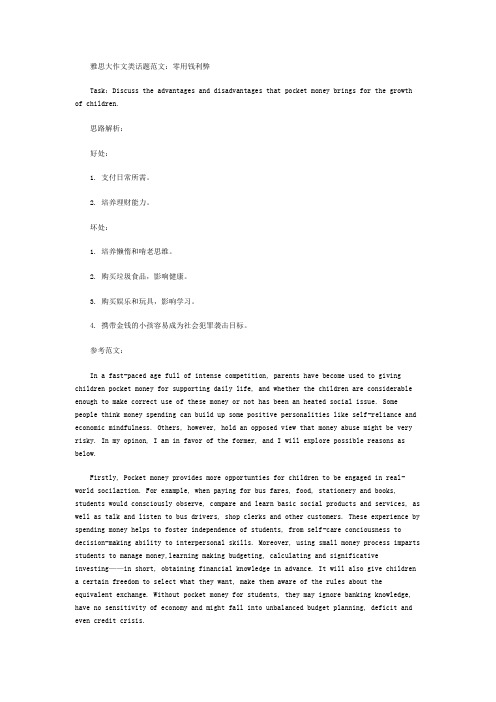
雅思大作文类话题范文:零用钱利弊Task:Discuss the advantages and disadvantages that pocket money brings for the growth of children.思路解析:好处:1. 支付日常所需。
2. 培养理财能力。
坏处:1. 培养懒惰和啃老思维。
2. 购买垃圾食品,影响健康。
3. 购买娱乐和玩具,影响学习。
4. 携带金钱的小孩容易成为社会犯罪袭击目标。
参考范文:In a fast-paced age full of intense competition, parents have become used to giving children pocket money for supporting daily life, and whether the children are considerable enough to make correct use of these money or not has been an heated social issue. Some people think money spending can build up some positive personalities like self-reliance and economic mindfulness. Others, however, hold an opposed view that money abuse might be very risky. In my opinon, I am in favor of the former, and I will explore possible reasons as below.Firstly, Pocket money provides more opportunties for children to be engaged in real-world socilaztion. For example, when paying for bus fares, food, stationery and books, students would consciously observe, compare and learn basic social products and services, as well as talk and listen to bus drivers, shop clerks and other customers. These experience by spending money helps to foster independence of students, from self-care conciousness to decision-making ability to interpersonal skills. Moreover, using small money process imparts students to managemoney,learning making budgeting, calculating and significative investing——in short, obtaining financial knowledge in advance. It will also give children a certain freedom to select what they want, make them aware of the rules about the equivalent exchange. Without pocket money for students, they may ignore banking knowledge, have no sensitivity of economy and might fall into unbalanced budget planning, deficit and even credit crisis.However, the potential demerits caused by money misusing should never be ignored. For one thing, there is always a big concern that by money, children with lack of self-control or maturemind can have an easy access to fastfood, soft drinks and candy, all of which containing high-level fat, calories and sugar. The comsuption of these junk traps children into chronic physical problems like obesity, high-blood presssure and heart disease. Besides, the most worrying aspect is that children are very likely to misspend money on movies, concerts of pop music, and Video games like Nintendo or Playstation, these entertainment will distract students from the aim of studying.In conclusion, I believe it is reasonable to give limited amount of money to children, because it can teach them social skills and finance-planning mind. However, much pocekt money beyond daily basic costs is problematic, for it might result in health problems and an amusement-oriented mind.(389 words)雅思大作文类话题范文:零用钱利弊。
议论文作文1100字:零用钱带来的利与弊

提供专业的word版文档,优质的服务,希望对您有帮助/双击去除议论文作文1100字:零用钱带来的利与弊议论文作文1100字:零用钱带来的利与弊在现在的社会中,普遍的家庭的生活水平都不同程度地提高了。
也有相当一部分人已进入了小康的生活水平。
而每个家庭一般都有一至两个孩子。
家长们由于种种的原因都会或多或少地给孩子们一些零用钱,而这些零用钱的使用权绝对是小朋友们支配的。
那么,父母所给的零用钱对于同学们到底是爱还是害呢?带着这个问题,我对我校的同学进行了调查。
据我调查,我校大约有百分之六十的同学会适当把零用钱用在买书籍、学习用品、早餐等方面;而大约百分之四十的同学却未能好好利用零用钱,经常都把父母所给的零用钱用来买零食——油炸食物、饮料等,或者买玩具,还有极个别的同学去打游戏机……前段时间,我对我班40位同学作了认真的观察、调查,发现每天上学、放学的时间都到学校附近的商店买零食的就有八、九个同学;而偶然(即一星期买两、三次)也有八、九个。
除此之外,也还有一星期买一、二次的。
而男女同学的比例是:男同学占十分之六,女同学占十分之四左右。
其中我班有两位男同学,他们家的生活非常富裕,每天口袋里都有大包大包零食、玩具,但学习成绩却很差,经常语、数、英三科都不合格。
如果认为他们的智力差,那才错呢,他们的说话水平、玩玩具的能力比很多同学都要高呢!我认为主要是他们每天都沉迷在吃、喝、玩、乐之中,根本无心向学造成的。
其实,父母给同学们一些零用钱是让他们买早餐或学习用品的,但是这些同学却把父母的“爱”变成了对自己的“害”。
很多事实说明,要成为一个有出息、有作为的人,并不一定需要零用钱,只须要勤奋刻苦学习就能够达到目标。
例如:古时候,有个人名叫沈约。
当他十二岁那年,父亲被朝廷杀了头,家里的财产全部被没收。
母亲带着沈约逃到外地。
他们一无所有,只好住在一间破庙中。
小沈约为了让妈妈过上好日子,发愤读书,争取成为一个有成就的人。
他从来没有零用钱,所以他不能买到书。
关于给小孩零花钱的好处坏处_英语作文

关于给小孩零花钱的好处坏处
随着现代社会的发展,人民的生活条件变得更加舒适。
但随着竞争激烈,家长有更少的时间来全面考虑儿童的需要。
解决这个ontradiction的一种方法是给孩子一些零花钱。
口袋里的钱是有用的儿童。
但孩子们是否相当,足以使这些钱的正确使用。
有关的口袋里的钱有两种观点。
有些人认为,给孩子零用钱,使他们成为豪华。
另一些人则认为不会导致这样的缺点。
在我看来,他们两个部分合理。
有人认为,让孩子们口袋里的钱真的有很多优点。
口袋里的钱,孩子们可以买到他们的日常生活必需品,如铅笔,小玩具,和他们喜欢的休闲食品。
它会给孩子一定的自由选择他们想要的东西,让他们知道等价交换规则。
由于父母的时间是很宝贵的,口袋里的钱给孩子,帮助他们节省购物所花费的时间,但在繁忙的工作和赚钱。
其他人则坚持认为,无疑是有一些缺点花零用钱。
首先,年轻的孩子不知道如何正确使用零花钱,他们可能消耗所有的钱购买昂贵的商品,他们喜欢,然后要求额外的钱从他们的父母。
有些家长溺爱自己的孩子,总是给他们大量的零花钱。
这种状况会使儿童成为越来越多的浪子。
其次,因为大人不监督的购物过程,孩子也许可以买东西,不适合他们的年龄,例如成人杂志。
看上面这两种观点提到,我认为,父母应给孩子零花钱的数量有限。
有一些先决条件:口袋里的钱的数额必须是有限的;家长应指导他们的子女如何使用这笔钱,中度及什么是适合他们了昂贵的商品,家长本身应考虑给孩子买它。
这些先决条件,口袋里的钱,不伤害自己的孩子。
父母应该给孩子零花钱吗英语作文
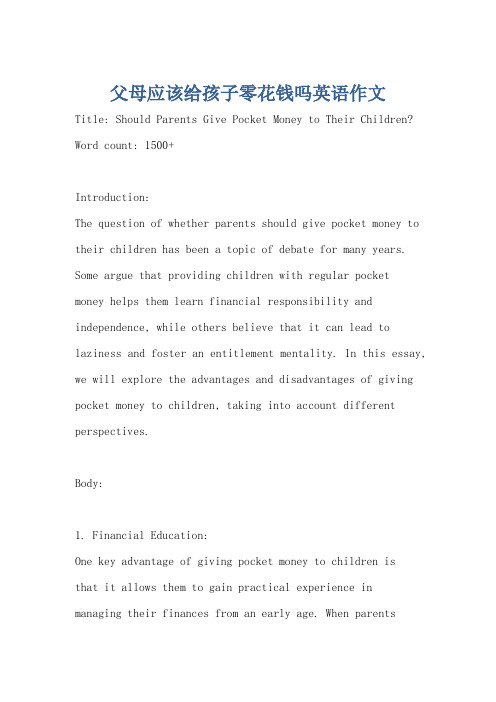
父母应该给孩子零花钱吗英语作文Title: Should Parents Give Pocket Money to Their Children? Word count: 1500+Introduction:The question of whether parents should give pocket money to their children has been a topic of debate for many years. Some argue that providing children with regular pocket money helps them learn financial responsibility and independence, while others believe that it can lead to laziness and foster an entitlement mentality. In this essay, we will explore the advantages and disadvantages of giving pocket money to children, taking into account different perspectives.Body:1. Financial Education:One key advantage of giving pocket money to children isthat it allows them to gain practical experience in managing their finances from an early age. When parentsgive their children a fixed amount of money on a regular basis, it teaches them the value of budgeting, saving, and making informed spending decisions. This hands-on financial education can equip children with valuable skills that will benefit them throughout their lives.2. Development of Responsibility:By receiving pocket money, children have the opportunity to take responsibility for their own needs and wants. They learn the importance of setting priorities and making choices based on limited resources. Moreover, when they run out of money before the next installment, they must wait or find ways to earn more—both experiences that contribute to their personal growth and self-discipline.3. Promoting Independence:Providing children with pocket money also encourages independence. When they have control over a certain portion of their finances, they are empowered to make decisions about how they want to spend or save that money. This autonomy fosters critical thinking skills as they weigh the consequences of their choices.4. Moral Values and Work Ethics:However, critics argue that giving pocket money may instill materialistic values in children and distance them from important life lessons such as the value of hard work and earning one's keep. They believe that earning an allowance through completing household chores or otherresponsibilities can teach children work ethics as well as the significance of contributing to family life.5. Teachable Moments:To strike a balance, parents can utilize pocket money as an opportunity for teachable moments. Instead of simply handing over cash, parents can guide their children on how to allocate their pocket money wisely. Discussing the value of saving for long-term goals or encouraging charitable giving can instill important values in children that go beyond pure financial management.6. Individual Circumstances:It is essential to recognize that every family's circumstances and dynamics are unique. Some families mayhave limited financial resources, while others may be more affluent. In such cases, it is necessary for parents to adjust the amount of pocket money accordingly and tailor their approach based on the needs and values of their specific household.Conclusion:In conclusion, whether parents should give pocket money to their children ultimately depends on individual circumstances and parenting philosophies. There are clear benefits to providing regular allowances, including financial education, responsibility development, and independence building. However, it is crucial for parents to strike a balance by incorporating teachable moments and considering the work ethics aspect as well. By doing so, parents can effectively teach children valuable lessons about money management while fostering personal growth and self-reliance.。
零花钱对青少年有什么好处英语作文
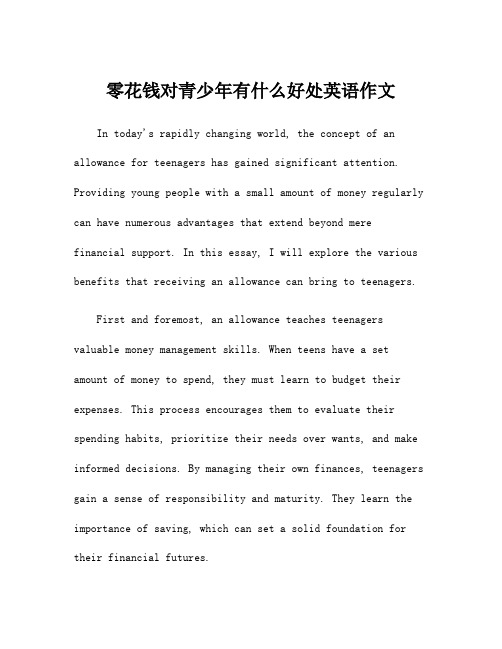
零花钱对青少年有什么好处英语作文In today's rapidly changing world, the concept of an allowance for teenagers has gained significant attention. Providing young people with a small amount of money regularly can have numerous advantages that extend beyond merefinancial support. In this essay, I will explore the various benefits that receiving an allowance can bring to teenagers.First and foremost, an allowance teaches teenagers valuable money management skills. When teens have a set amount of money to spend, they must learn to budget their expenses. This process encourages them to evaluate their spending habits, prioritize their needs over wants, and make informed decisions. By managing their own finances, teenagers gain a sense of responsibility and maturity. They learn the importance of saving, which can set a solid foundation for their financial futures.Moreover, an allowance can foster a sense of independence. Having their own money allows teenagers to make choices about how to spend it. This independence is crucial as theytransition from childhood to adulthood. They can choose to save for a particular goal, such as a new gadget or a special outing with friends. This autonomy not only boosts their confidence but also helps them understand the consequences of their financial decisions, both positive and negative.Additionally, receiving an allowance can enhance a teenager's understanding of the value of money. When they are responsible for earning or managing their allowance, theybegin to appreciate the effort that goes into earning money. This appreciation can lead to a more considerate approach to spending, as they become more mindful of the worth of theitems they desire. This understanding can discourageimpulsive buying and promote thoughtful consideration before making a purchase.Furthermore, an allowance can be a great incentive for teenagers to take on responsibilities. Many parents tie allowances to chores or good academic performance, encouraging teens to contribute to household tasks or excel in their studies. This approach not only instills a strong work ethic but also teaches them that hard work and dedication yield rewards. Such lessons are invaluable as they prepare for future employment and professional life.Lastly, having an allowance provides an opportunity for teenagers to experience financial setbacks in a safe environment. When they exhaust their funds before the next allowance date, they face the consequences of their spending habits. This experience teaches them resilience and the need to plan better for the future. Learning to cope withfinancial challenges at a young age fosters adaptability and problem-solving skills.In conclusion, an allowance offers exceptional benefits for teenagers. It equips them with essential money management skills, fosters independence, and enhances their understanding of the value of money. Additionally, it encourages responsibility and allows for important learning experiences related to financial setbacks. By providing teenagers with an allowance, parents can play a crucial role in preparing them for a financially responsible adulthood.。
英语作文零花钱的使用情况及理由
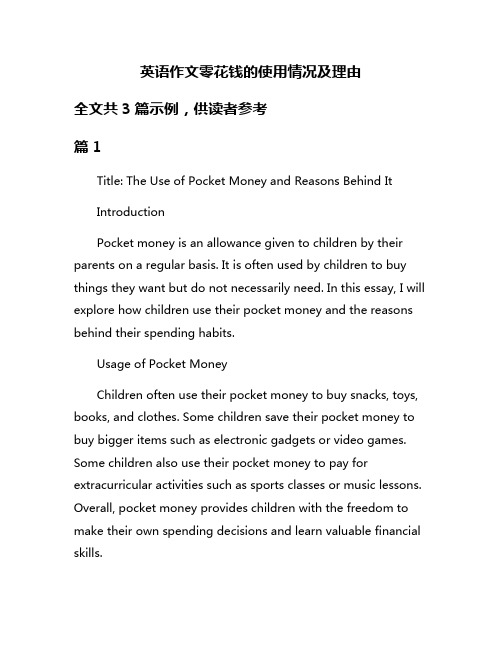
英语作文零花钱的使用情况及理由全文共3篇示例,供读者参考篇1Title: The Use of Pocket Money and Reasons Behind ItIntroductionPocket money is an allowance given to children by their parents on a regular basis. It is often used by children to buy things they want but do not necessarily need. In this essay, I will explore how children use their pocket money and the reasons behind their spending habits.Usage of Pocket MoneyChildren often use their pocket money to buy snacks, toys, books, and clothes. Some children save their pocket money to buy bigger items such as electronic gadgets or video games. Some children also use their pocket money to pay for extracurricular activities such as sports classes or music lessons. Overall, pocket money provides children with the freedom to make their own spending decisions and learn valuable financial skills.Reasons Behind Pocket Money UsageThere are several reasons why children spend their pocket money in a certain way. Firstly, children have their own preferences and interests, which influence their spending habits. For example, a child who loves reading may spend their pocket money on books, while a child who enjoys playing video games may spend their money on gaming consoles or accessories.Secondly, children's spending habits may be influenced by their peers. Children often want to fit in with their friends and may feel pressured to spend their pocket money on the same things as their peers. This can lead to children buying things they do not necessarily need just to keep up with their friends.Thirdly, parents play a role in shaping their children's spending habits. Some parents may encourage their children to save a portion of their pocket money for future expenses, while others may allow their children to spend their money freely. Parents' attitudes towards money and spending can also affect how children use their pocket money.ConclusionIn conclusion, pocket money is a valuable tool for children to learn financial responsibility and make their own spendingdecisions. By understanding how children use their pocket money and the reasons behind their spending habits, parents can guide their children towards making wise financial choices. Ultimately, pocket money should be used as a learning opportunity for children to develop good money management skills that will benefit them throughout their lives.篇2Title: How I Spend My Pocket Money and Reasons Behind ItIntroduction:Pocket money is a small amount of money given to children by their parents, typically on a regular basis. As a teenager, I receive a certain amount of pocket money each week from my parents. In this essay, I will discuss how I spend my pocket money and the reasons behind my spending habits.Body:1. Saving:One of the main ways I use my pocket money is by saving it.I believe that saving money is important as it helps to create a financial safety net for the future. I save a portion of my pocket money each week in a piggy bank or a savings account. Thismoney comes in handy for unexpected expenses or for larger purchases that I may want to make in the future.2. Education:Another way I use my pocket money is for educational purposes. I invest in books, study materials, and online courses to enhance my knowledge and skills. I believe that investing in education is crucial for personal growth and development. By spending my pocket money on educational resources, I am able to broaden my horizons and set myself up for success in the future.3. Hobbies and interests:I also use my pocket money to indulge in my hobbies and interests. Whether it's buying art supplies for painting, new equipment for a sport I enjoy, or tickets to a concert or movie, I believe that spending money on things that bring me joy and fulfillment is important for my overall well-being. Hobbies and interests help me relax, de-stress, and express my creativity.4. Charity:I strongly believe in giving back to those in need. Therefore, I allocate a portion of my pocket money to donate to charitable organizations or support causes that I am passionate about. Bycontributing to charity, I am able to make a positive impact on society and help those who are less fortunate. This not only makes me feel good but also teaches me the value of generosity and compassion.5. Personal grooming and appearance:As a teenager, I also spend some of my pocket money on personal grooming and appearance. This includes buying skincare products, makeup, haircare products, and clothing. I believe that taking care of oneself and presenting oneself well is important for self-confidence and self-esteem. By spending money on personal grooming, I feel more confident in my own skin and ready to face the world.Conclusion:In conclusion, how I spend my pocket money reflects my values, priorities, and goals. I believe in saving for the future, investing in education, indulging in hobbies, giving back to society, and taking care of myself. By making intentional and mindful choices with my pocket money, I am able to lead a fulfilling and purposeful life.篇3Title: The Use of Pocket Money and Reasons Behind ItIntroductionPocket money is the allowance given to children by their parents or guardians for their personal expenses. It teaches children the value of money and helps them manage their finances. In this essay, we will discuss the importance of pocket money and how children can make the most of it.Benefits of Pocket Money1. Financial literacy: Pocket money teaches children about budgeting, saving, and spending wisely. It helps them understand the concept of earning and saving money.2. Independence: By having their own money, children learn to make decisions about how to spend it. They learn to prioritize their needs and wants.3. Responsibility: Managing pocket money instills a sense of responsibility in children. They learn to take care of their belongings and understand the consequences of their spending habits.4. Self-control: Pocket money encourages children to resist impulse buying and think carefully before making a purchase. They learn to differentiate between needs and wants.5. Reward for chores: Pocket money can be used as a reward for completing household chores or achieving academic goals. It motivates children to be more responsible and disciplined.Uses of Pocket Money1. Saving: Children can save a portion of their pocket money for future expenses or to buy something they really want. It teaches them the importance of setting aside money for emergencies.2. Spending: Children can use their pocket money to buy small items like snacks, toys, books, or stationery. It gives them the freedom to make choices and enjoy little pleasures.3. Giving: Children can learn the value of generosity by using their pocket money to help others in need. They can donate to charities or buy gifts for family members.4. Investing: Older children can learn about investing by putting their pocket money in a savings account or buying shares. It allows them to understand how money can grow over time.Limitations of Pocket Money1. Excessive spending: Children may develop a habit of overspending if they have too much pocket money. Parents should set limits and encourage responsible spending.2. Lack of accountability: Some children may misuse their pocket money if they are not held accountable for their expenses. Parents should monitor how their children are using their allowance.3. Unrealistic expectations: Children may develop unrealistic expectations about money if they receive a large amount of pocket money. Parents should teach them the value of hard work and earning money.ConclusionIn conclusion, pocket money plays a vital role in shaping children's financial habits and teaching them important life skills. It is essential for parents to set clear guidelines and encourage responsible money management. By using their pocket money wisely, children can learn the value of money and develop good financial habits that will benefit them in the long run.。
关于零花钱的英语作文

关于零花钱的英语作文Pocket money, a small allowance given to children by their parents, plays a crucial role in instilling financialliteracy from a young age. This essay will explore the importance of pocket money in teaching children about money management, responsibility, and the value of hard work.Firstly, pocket money serves as an introduction to the concept of money. When children receive a fixed amount of money on a regular basis, they learn to understand the value of currency and the need to make choices about how to spend or save it. This early exposure to financial concepts can lay the groundwork for a lifetime of sound financial decision-making.Secondly, pocket money encourages children to develop budgeting skills. With a limited amount of money, children must prioritize their wants and needs. They learn to differentiate between necessities and luxuries, a skill that is essential for responsible financial management in adulthood.Thirdly, pocket money can be a powerful tool for teaching the value of hard work. By setting up a system where children can earn additional money through chores or tasks, parents can instill a strong work ethic. This not only helps children understand that money is earned through effort but also fosters a sense of accomplishment.Moreover, pocket money provides an opportunity for children to learn about saving and investing. When children have their own money, they can be encouraged to save a portion forfuture purchases or to invest in a savings account. This helps them understand the concept of delayed gratification and the benefits of long-term financial planning.Lastly, pocket money can also be used to teach children about charitable giving. Parents can encourage their children to donate a small portion of their allowance to a charitable cause. This practice cultivates empathy and social responsibility, showing children that they can make apositive impact on the lives of others.In conclusion, pocket money is not merely a privilege for children; it is an educational tool that can significantly influence their financial behavior as they grow up. By using pocket money wisely, parents can equip their children with the skills and knowledge necessary to become financially responsible adults.。
零花钱的用途作文
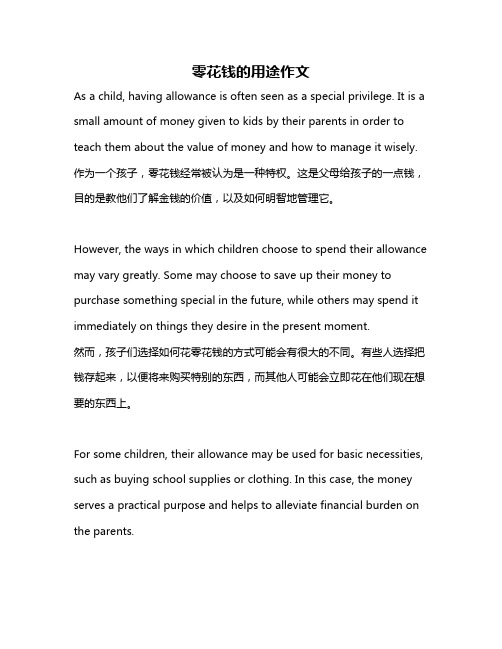
零花钱的用途作文As a child, having allowance is often seen as a special privilege. It is a small amount of money given to kids by their parents in order to teach them about the value of money and how to manage it wisely. 作为一个孩子,零花钱经常被认为是一种特权。
这是父母给孩子的一点钱,目的是教他们了解金钱的价值,以及如何明智地管理它。
However, the ways in which children choose to spend their allowance may vary greatly. Some may choose to save up their money to purchase something special in the future, while others may spend it immediately on things they desire in the present moment.然而,孩子们选择如何花零花钱的方式可能会有很大的不同。
有些人选择把钱存起来,以便将来购买特别的东西,而其他人可能会立即花在他们现在想要的东西上。
For some children, their allowance may be used for basic necessities, such as buying school supplies or clothing. In this case, the money serves a practical purpose and helps to alleviate financial burden on the parents.对于一些孩子来说,他们的零花钱可能用于购买基本必需品,比如购买学习用品或衣物。
零用钱使用情况和理由英语作文
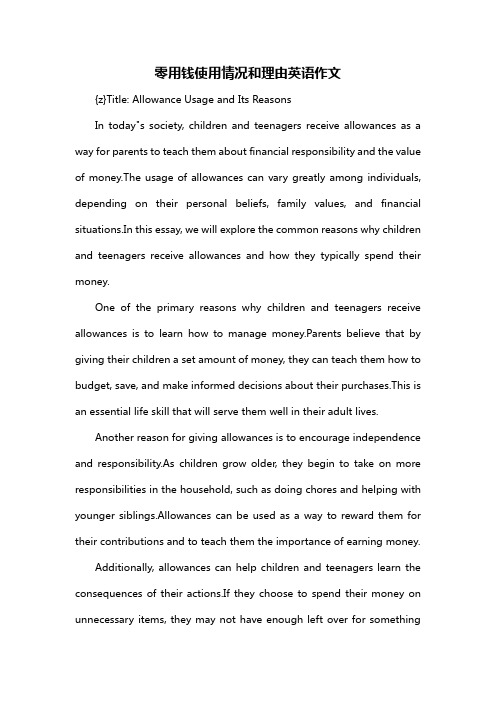
零用钱使用情况和理由英语作文{z}Title: Allowance Usage and Its ReasonsIn today"s society, children and teenagers receive allowances as a way for parents to teach them about financial responsibility and the value of money.The usage of allowances can vary greatly among individuals, depending on their personal beliefs, family values, and financial situations.In this essay, we will explore the common reasons why children and teenagers receive allowances and how they typically spend their money.One of the primary reasons why children and teenagers receive allowances is to learn how to manage money.Parents believe that by giving their children a set amount of money, they can teach them how to budget, save, and make informed decisions about their purchases.This is an essential life skill that will serve them well in their adult lives.Another reason for giving allowances is to encourage independence and responsibility.As children grow older, they begin to take on more responsibilities in the household, such as doing chores and helping with younger siblings.Allowances can be used as a way to reward them for their contributions and to teach them the importance of earning money.Additionally, allowances can help children and teenagers learn the consequences of their actions.If they choose to spend their money on unnecessary items, they may not have enough left over for somethingthey really want or need.This can teach them the importance of making wise decisions and considering the long-term consequences of their actions.So, how do children and teenagers typically spend their allowances? The answer may vary depending on their age and personal preferences.Younger children may spend their money on toys, games, or snacks, while older teenagers may choose to spend their money on clothing, electronics, or entertainment.Some children may choose to save their money for a future purchase, while others may choose to donate a portion of their allowance to charity.In conclusion, allowances are a common practice in many households and serve various purposes.They can teach children and teenagers about financial responsibility, independence, and the consequences of their actions.As parents, it is essential to communicate with your children about the purpose of their allowances and guide them in making wise financial decisions.。
英语作文零用钱

英语作文零用钱Pocket Money。
Introduction:Pocket money is a small amount of money given to children by their parents on a regular basis. It is a great way for children to learn about money management and develop financial responsibility. In this article, we will explore the importance of pocket money and how it can benefit children.Body:1. Teaching Financial Responsibility:Pocket money provides an opportunity for children to learn about money management from an early age. By receiving a fixed amount of money regularly, children can learn to budget and make decisions about how to spend or save their money. This helps them understand the value of money and the importance of making wise financial choices.2. Developing Independence:When children receive pocket money, they have the freedom to make their own decisions about how to spend it. This encourages independence and helps them develop decision-making skills. They learn to prioritize their needs and wants, and understand the consequences of their choices. This sense of independence is crucial for their personal growth and development.3. Learning the Value of Hard Work:Parents can use pocket money as a way to teach children the value of hard work. Instead of simply giving them money, parents can assign chores or tasks that children need to complete in order to earn their pocket money. This instills a sense ofresponsibility and work ethic in children, as they understand that money is earned through effort and commitment.4. Financial Planning Skills:Pocket money allows children to practice financial planning at a young age. They learn to set goals and save money for things they want. By saving a portion of their pocket money regularly, children can accumulate enough money to buy larger items or fulfill their long-term desires. This teaches them the importance of delayed gratification and the rewards of saving.5. Understanding the Value of Money:Receiving pocket money helps children understand the value of money and the effort required to earn it. They become aware of the cost of things they desire and learn to make informed choices. This understanding lays a strong foundation for their future financial decisions and helps them become responsible consumers.6. Building Confidence:When children receive pocket money, they gain a sense of financial independence, which in turn boosts their confidence. They learn to manage their own money and make decisions based on their needs and preferences. This confidence extends beyond financial matters and helps them develop a sense of self-assurance in other areas of life as well.Conclusion:Pocket money plays a crucial role in a child's development. It teaches financial responsibility, independence, and the value of hard work. By allowing children to make their own financial decisions and practice financial planning, pocket money equips them with essential life skills. It is important for parents to provide pocket money in a controlled and responsible manner, ensuring that children learn valuable lessons about money management from an early age.。
对零花钱的看法英语作文
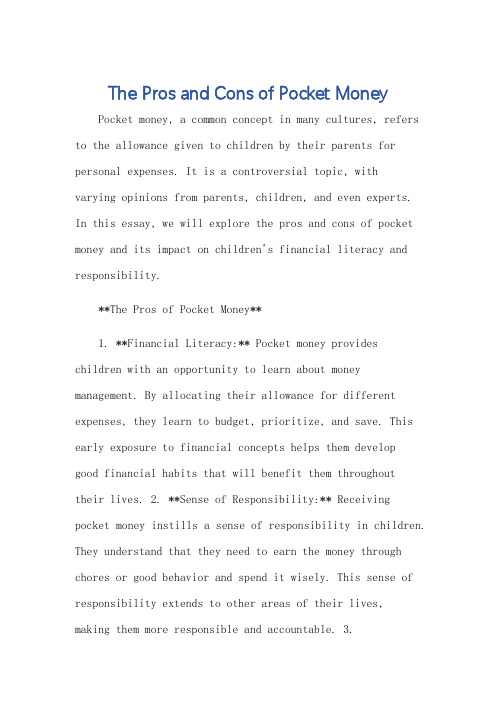
The Pros and Cons of Pocket MoneyPocket money, a common concept in many cultures, refers to the allowance given to children by their parents for personal expenses. It is a controversial topic, withvarying opinions from parents, children, and even experts.In this essay, we will explore the pros and cons of pocket money and its impact on children's financial literacy and responsibility.**The Pros of Pocket Money**1. **Financial Literacy:** Pocket money provideschildren with an opportunity to learn about money management. By allocating their allowance for different expenses, they learn to budget, prioritize, and save. This early exposure to financial concepts helps them developgood financial habits that will benefit them throughouttheir lives. 2. **Sense of Responsibility:** Receiving pocket money instills a sense of responsibility in children. They understand that they need to earn the money through chores or good behavior and spend it wisely. This sense of responsibility extends to other areas of their lives, making them more responsible and accountable. 3.**Autonomy:** Pocket money gives children a sense of autonomy and independence. They can make their own decisions about what to buy and how to spend their money. This autonomy helps them develop critical thinking skills and learn to make informed decisions. 4. **Social Skills:** Pocket money also provides children with an opportunity to socialize and interact with others. They can buy things for their friends or participate in group activities, which helps them develop social skills and a sense of community. **The Cons of Pocket Money**1. **Mismanagement:** Without proper guidance, children may mismanage their pocket money, spending it all at once or on unnecessary items. This can lead to a lack of savings and financial instability in the future.2. **Pressure to Consume:** In a consumer-driven society, pocket money can expose children to the pressure to consume and keep up with peers. This may lead them to develop unhealthy financial habits, such as impulse buying or excessive spending.3.**Discrimination:** Pocket money can create a sense of discrimination among children. Those who receive more may feel superior, while those who receive less may feelinferior. This can lead to conflicts and divided cliques within social groups. 4. **Dependence on Parents:** If pocket money is given unconditionally, children may become dependent on their parents for financial support. This can hinder their ability to become independent and self-reliant adults.**Conclusion**Pocket money, like any other tool, can be a double-edged sword. When used effectively, it can help children develop good financial habits and a sense of responsibility. However, when mismanaged or abused, it can lead tofinancial instability and unhealthy habits. Therefore, itis crucial for parents to educate their children about money management and instill in them the values of responsibility, saving, and budgeting. By doing so, pocket money can become a valuable tool for fostering financial literacy and responsible behavior among children.**零花钱的利弊**零花钱,在许多文化中都是一个普遍的概念,指的是父母给孩子的个人开支费用。
fce青少年是否应有零花钱的写作范文

fce青少年是否应有零花钱的写作范文摘要:一、引言1.青少年是否应有零花钱的争议背景2.零花钱对青少年成长的影响二、正方观点:青少年应该有零花钱1.零花钱能培养青少年的消费观念2.零花钱有助于培养青少年的社交能力3.零花钱可以激发青少年的创造力三、反方观点:青少年不应有零花钱1.零花钱可能导致青少年养成不良消费习惯2.零花钱与学业成绩的关系3.零花钱对家庭负担的影响四、我国政策及家庭现状1.我国相关政策规定2.家庭对青少年零花钱的把控五、结论1.零花钱并非绝对好与坏,要适度2.家庭和学校在引导青少年合理使用零花钱方面的责任3.青少年自身应学会理财,养成良好的消费习惯正文:随着社会经济的发展,青少年是否应有零花钱的问题引发了广泛关注。
一方面,零花钱能够培养青少年的消费观念,帮助他们适应社会生活;另一方面,过度给予零花钱可能导致青少年养成不良消费习惯,影响他们的学业和成长。
本文将对此问题进行深入探讨,以期为家长和教育工作者提供有益的参考。
正方观点认为,青少年应该有零花钱。
首先,零花钱能培养青少年的消费观念。
在现代社会,金钱交易无处不在,青少年通过使用零花钱,可以学会分辨商品的价值,培养合理消费的习惯。
其次,零花钱有助于培养青少年的社交能力。
在与同伴交往的过程中,青少年可以学会人际沟通、分享和互助,这对于他们日后的人生具有重要意义。
最后,零花钱可以激发青少年的创造力。
在一定程度上,金钱可以为青少年提供更多的实践和探索机会,激发他们的创新思维。
然而,反方观点认为青少年不应有零花钱。
一方面,零花钱可能导致青少年养成不良消费习惯。
过多地依赖零花钱,容易使青少年产生攀比心理,进而陷入消费主义的漩涡。
另一方面,零花钱与学业成绩的关系值得关注。
如果青少年将大量时间和精力投入到购物等消费活动中,势必会影响他们的学业表现。
此外,过多的零花钱还可能导致家庭负担加重,影响家庭和谐。
在我国,相关政策规定了青少年零花钱的合理范围。
零用钱使用情况和理由英语作文

The Usage and Rationale of PocketMoneyPocket money, a common concept in many households, refers to the small amount of cash given to children for their daily expenses and discretionary use. The allocation and spending of pocket money often reflect the financial education and values of the family. This essay delves into the various usages and rationales behind pocket money, exploring its significance in the lives of children.Firstly, pocket money serves as a practical tool for teaching children financial responsibility. By allocating a fixed amount of money to children, parents encourage them to budget and prioritize their expenses. For instance, a child might need to decide between buying a snack or saving up for a toy. This process helps them understand the value of money and the consequences of spending impulsively.Secondly, pocket money provides children with a sense ofautonomy and independence. Having their own money gives children the freedom to make small decisions without constantly seeking approval from their parents. This fosters a sense of empowerment and encourages them to take ownership of their actions.Moreover, pocket money can be used as a reward system for good behavior or academic achievements. By rewarding children with additional pocket money, parents can incentivize positive behaviors such as completing homework, helping with household chores, or exhibiting kindness towards others. This not only encourages desired behaviors but also teaches children the link between effort and reward.However, it is crucial for parents to monitor and guide their children's spending habits. Excessive spending on unnecessary items can lead to unhealthy financial habits in the long run. Parents should engage in open discussions with their children about responsible spending and saving, ensuring that they understand the importance of financial discipline.In conclusion, pocket money plays a pivotal role in the financial education of children. It teaches them financial responsibility, autonomy, and the link between effort and reward. By guiding their spending habits, parents can ensure that pocket money serves as a valuable tool for financial literacy and personal growth.**零用钱的使用情况和理由**零用钱,在许多家庭中都是一个常见的概念,指的是给孩子们用于日常开销和自主支配的小额现金。
零用钱使用的情况英语作文
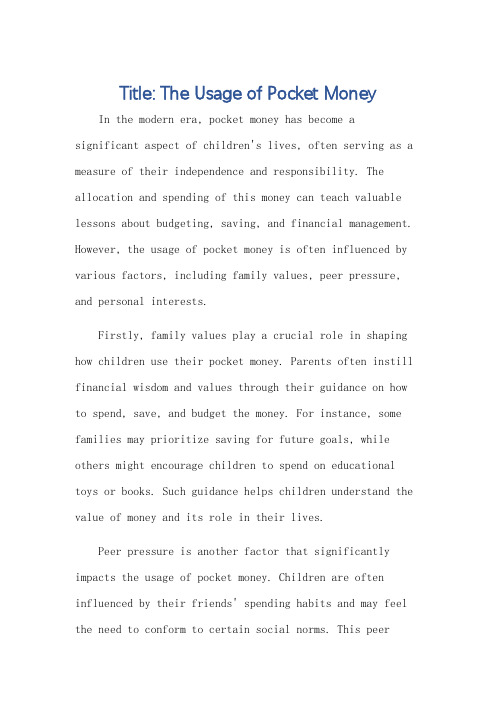
Title: The Usage of Pocket MoneyIn the modern era, pocket money has become a significant aspect of children's lives, often serving as a measure of their independence and responsibility. The allocation and spending of this money can teach valuable lessons about budgeting, saving, and financial management. However, the usage of pocket money is often influenced by various factors, including family values, peer pressure, and personal interests.Firstly, family values play a crucial role in shaping how children use their pocket money. Parents often instill financial wisdom and values through their guidance on how to spend, save, and budget the money. For instance, some families may prioritize saving for future goals, while others might encourage children to spend on educational toys or books. Such guidance helps children understand the value of money and its role in their lives.Peer pressure is another factor that significantly impacts the usage of pocket money. Children are often influenced by their friends' spending habits and may feel the need to conform to certain social norms. This peerinfluence can lead them to spend excessively on popular items or experiences, even if they do not align with their personal values or financial goals.Moreover, personal interests also play a significant role in determining how children spend their pocket money. Children often have unique hobbies and passions that they want to pursue, and their spending habits often reflect this. For instance, a child interested in sports may spend their money on sports equipment or tickets to games, while another child interested in art may prefer to buy art supplies or attend workshops.Despite these influencing factors, it is crucial for children to learn the importance of responsible spending. They should be encouraged to make wise decisions,prioritize their needs, and avoid impulse purchases. Additionally, saving a portion of their pocket money can help them build a savings habit, which is essential for financial stability in the future.In conclusion, the usage of pocket money is a complex phenomenon influenced by various factors. However, by instilling financial wisdom, encouraging responsiblespending, and respecting personal interests, children can learn valuable lessons about money management that will benefit them throughout their lives.**零用钱使用的情况**在现代社会,零用钱已成为孩子们生活中不可或缺的一部分,它不仅是孩子们独立性和责任感的体现,而且能够教会他们有关预算、储蓄和财务管理的宝贵经验。
关于零花钱使用的英语作文 初二
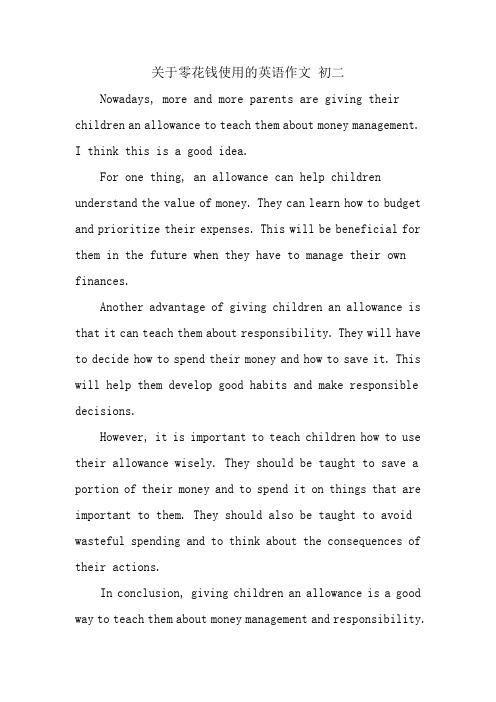
关于零花钱使用的英语作文初二Nowadays, more and more parents are giving their children an allowance to teach them about money management.I think this is a good idea.For one thing, an allowance can help children understand the value of money. They can learn how to budget and prioritize their expenses. This will be beneficial for them in the future when they have to manage their own finances.Another advantage of giving children an allowance is that it can teach them about responsibility. They will have to decide how to spend their money and how to save it. This will help them develop good habits and make responsible decisions.However, it is important to teach children how to use their allowance wisely. They should be taught to save a portion of their money and to spend it on things that are important to them. They should also be taught to avoid wasteful spending and to think about the consequences of their actions.In conclusion, giving children an allowance is a good way to teach them about money management and responsibility.However, it is important to teach them how to use their allowance wisely.中文翻译:如今,越来越多的父母给孩子零花钱,以教会他们管理金钱。
青少年应不应该十块钱的零花钱英语作文儿
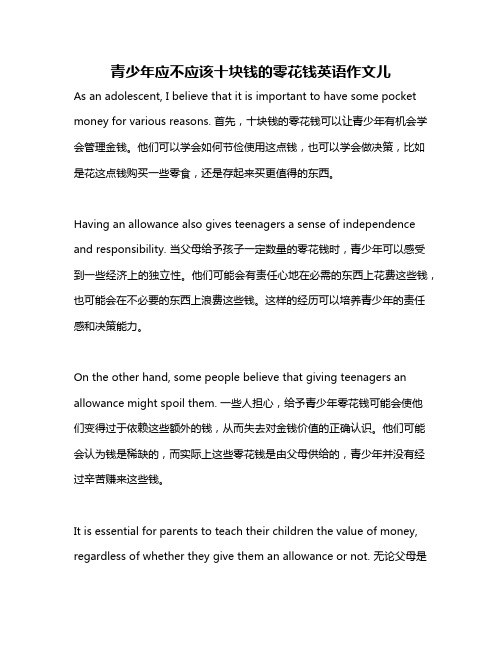
青少年应不应该十块钱的零花钱英语作文儿As an adolescent, I believe that it is important to have some pocket money for various reasons. 首先,十块钱的零花钱可以让青少年有机会学会管理金钱。
他们可以学会如何节俭使用这点钱,也可以学会做决策,比如是花这点钱购买一些零食,还是存起来买更值得的东西。
Having an allowance also gives teenagers a sense of independence and responsibility. 当父母给予孩子一定数量的零花钱时,青少年可以感受到一些经济上的独立性。
他们可能会有责任心地在必需的东西上花费这些钱,也可能会在不必要的东西上浪费这些钱。
这样的经历可以培养青少年的责任感和决策能力。
On the other hand, some people believe that giving teenagers an allowance might spoil them. 一些人担心,给予青少年零花钱可能会使他们变得过于依赖这些额外的钱,从而失去对金钱价值的正确认识。
他们可能会认为钱是稀缺的,而实际上这些零花钱是由父母供给的,青少年并没有经过辛苦赚来这些钱。
It is essential for parents to teach their children the value of money, regardless of whether they give them an allowance or not. 无论父母是否给予青少年零花钱,教育孩子们理财和金钱价值观都至关重要。
父母可以设定一些规矩,比如必须存一部分零花钱作为未来的储蓄,或者只能在某些特定的情况下才能使用零花钱。
这样可以帮助青少年们认识到金钱的重要性和限制。
同时,父母也需要做出表率,给青少年正确的金钱价值观念。
fce青少年是否应有零花钱的写作范文
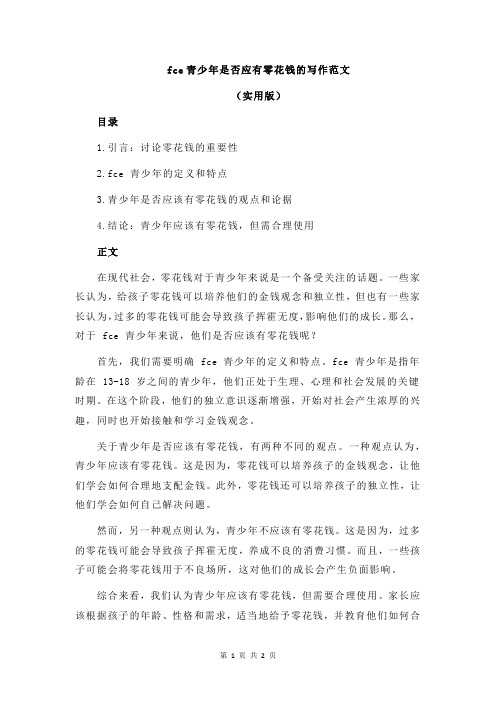
fce青少年是否应有零花钱的写作范文(实用版)目录1.引言:讨论零花钱的重要性2.fce 青少年的定义和特点3.青少年是否应该有零花钱的观点和论据4.结论:青少年应该有零花钱,但需合理使用正文在现代社会,零花钱对于青少年来说是一个备受关注的话题。
一些家长认为,给孩子零花钱可以培养他们的金钱观念和独立性,但也有一些家长认为,过多的零花钱可能会导致孩子挥霍无度,影响他们的成长。
那么,对于 fce 青少年来说,他们是否应该有零花钱呢?首先,我们需要明确 fce 青少年的定义和特点。
fce 青少年是指年龄在 13-18 岁之间的青少年,他们正处于生理、心理和社会发展的关键时期。
在这个阶段,他们的独立意识逐渐增强,开始对社会产生浓厚的兴趣,同时也开始接触和学习金钱观念。
关于青少年是否应该有零花钱,有两种不同的观点。
一种观点认为,青少年应该有零花钱。
这是因为,零花钱可以培养孩子的金钱观念,让他们学会如何合理地支配金钱。
此外,零花钱还可以培养孩子的独立性,让他们学会如何自己解决问题。
然而,另一种观点则认为,青少年不应该有零花钱。
这是因为,过多的零花钱可能会导致孩子挥霍无度,养成不良的消费习惯。
而且,一些孩子可能会将零花钱用于不良场所,这对他们的成长会产生负面影响。
综合来看,我们认为青少年应该有零花钱,但需要合理使用。
家长应该根据孩子的年龄、性格和需求,适当地给予零花钱,并教育他们如何合理地支配。
同时,家长也应该关注孩子的零花钱使用情况,及时发现和纠正不良的消费行为。
总之,零花钱对于青少年的成长具有一定的积极意义,但我们也需要注意其潜在的负面影响。
【2019最新】雅思写作范文:零用钱对孩子的利弊-范文模板 (1页)

【2019最新】雅思写作范文:零用钱对孩子的利弊-范文模板本文部分内容来自网络整理,本司不为其真实性负责,如有异议或侵权请及时联系,本司将立即删除!== 本文为word格式,下载后可方便编辑和修改! ==雅思写作范文:零用钱对孩子的利弊下面雅思为大家整理了雅思写作范文:零用钱对孩子的利弊,供考生们参考,以下是详细内容。
With the development of our modern society , peoples living conditions become much more comfortable . But along with intense competition , parents have less time to consider childrens needs inall - round . One method to solve this contradiction is to give children some pocket money . Pocket money is useful to children . But whether the children are considerable enough to make correct use of these money . There are two viewpoints about the pocket money . Some people think that giving children pocket money will make them become luxurious . Others think that will not lead to such disadvantage . In my opinion , both of them are partially reasonable .Someone believe that giving children pocket money really has many advantages . With pocket money , children can buy their daily necessities such as pencils , little toys , and snack food they like . It will give children a certain freedom to select what they want , make them aware rules of the equivalent exchange . Since time to parents is very precious , giving pocket money to children help themto save time spent in shopping , but used in busy working and earning money .Others insist that there are undoubtedly some disadvantages in spending pocket money . First , young children do not know how to use pocket money appropriately , they possibly consume all the money to buy expensive merchandise that they like , and then ask for extra money from their parents . Some parents cosset their children , and always give them a large amount of pocket money . Such conditionswill make children become more and more prodigal . Second , since adults do not supervise the procedure of shopping , children could probably buy something that is not suitable for their age , such as adult magazines .。
你对孩子的零用钱有什么意见?_大学英语作文

你对孩子的零用钱有什么意见?Nowadays, it is a commonplace that children own startle amount of pocket money. These new moneybags never earned one dollar but had glorious consumptive point of view. As far as I am concerned, we should decrease their pocket money. The reasons can be listed as following.First , money produce negative effect on children. As I can see, there are few children could make a correct decision on purchasing, especially as the sum of the money is affluent. They always use it in some harmful ways, such as trying to drink and smoke. It is danger both on their physical and mental aspects.Second, parents should change their way to express their love. In China, giving a little money to children is a traditional way to show the love of the adult. With the increasing amount of money that has be given , some children become a moneybags during one night. In this reason, changing the way to express our feeling is necessary. In order to red uce children’s money as well as the bad influence from money,….At last but not least, schools and our society would offer the kids an opportunity to earn money by their labor. The proverb goes : no pay no gain. The junior moneybags cannot image the difficulties to earn money if they never try.From what has been discussed above, we come to the conclusion that we cannot ignore the gradually increasing pocket money of children. Because money would bring pernicious implication on children.。
雅思写作素材拓展:零用钱对孩子的利弊

智课网IELTS备考资料雅思写作素材拓展:零用钱对孩子的利弊摘要:今天小马过河在线雅思频道为大家收集整理的雅思写作素材拓展:零用钱对孩子的利弊,供大家参考,希望大家在以后的练习当中,能够灵活的应用,只有这样才能在雅思考试当中取得好成绩。
1. Help the children understand the value of money and how to use the money responsibly.2. The money parents give help the children learn to manage money, and they can understand how budgeting, saving and interest work. In this way, they can develop wise spending habits.3. It helps raise a money-savvy child.4. Cultivate a spir it of independence and learning to make decision on one’s own.5. Such goal-setting helps children learn to become responsible for themselves.6. Children are willing learners, and you will find by giving pocket money, you can get them very interested in whole process of building a healthy saving for the future.7. Young children especially enjoy watching the money build up in their piggy banks, and they love to take it out and count it. This is a great opportunity to teach your child the different denominations in our currency , and what eachcoin and bill is worth.8. It is the beast way to introduce your child to the concept of saving.9. Money management is seldom taught in schools; it is up to the parents to educate their children in this very important life skill.10. It is a way to help educate children about personal finance and managing money.11. Parents don’t have to worry about being constantly asked to buy things for the kids.12. Children can learn how and why to save money.以上就是小编为大家带来的雅思写作素材拓展:零用钱对孩子的利弊全部内容,希望大家在平时要多加练习,只有在平时的时候多加练习,才能在雅思考试当中熟练掌握,正确应用,从而提高我们的雅思成绩,预祝大家取得好成绩。
- 1、下载文档前请自行甄别文档内容的完整性,平台不提供额外的编辑、内容补充、找答案等附加服务。
- 2、"仅部分预览"的文档,不可在线预览部分如存在完整性等问题,可反馈申请退款(可完整预览的文档不适用该条件!)。
- 3、如文档侵犯您的权益,请联系客服反馈,我们会尽快为您处理(人工客服工作时间:9:00-18:30)。
雅思大作文范文:零用钱对孩子的利弊
这是雅思大作文范文《零用钱对孩子的利弊》,供大家阅读参考。
认真研读一定的雅思范文及作文模板可以帮助我们检验自己的写作水平,并能很好地吸收和应用优秀范文里的优秀内容。
With the development of our modern society, people’s living conditions become much more comfortable. But along with intense competition, parents have less time to consider children’s needs in
all-round. One method to solve this contradiction is to give children some pocket money. Pocket money is useful to children. But whether the children are considerable enough to make correct use of these money. There are two viewpoints about the pocket money. Some people think that giving children pocket money will make them become luxurious. Others think that will not lead to such disadvantage. In my opinion, both of them are partially reasonable.
Someone believe that giving children pocket money really has many advantages. With pocket money, children can buy their daily necessities such as pencils, little toys, and snack food they like. It will give children a certain freedom to select what they want, make them aware rules of the equivalent exchange. Since time to parents is very precious, giving
pocket money to children help them to save time spent in shopping, but used in busy working and earning money.
Others insist that there are undoubtedly some disadvantages in spending pocket money. First, young children do not know how to use pocket money appropriately, they possibly consume all the money to buy expensive merchandise that they like, and then ask for extra money from their parents. Some parents cosset their children, and always give them a large amount of pocket money. Such conditions will make children become more and more prodigal. Second, since adults do not supervise the procedure of shopping, children could probably buy something that is not suitable for their age, such as adult magazines.
Judging these two viewpoints above-mentioned, I think that parents should give their children a limited amount of pocket money. There are some preconditions: the amount of pocket money must be finite; the parents should instruct their children how to use the money moderately and what is suitable to them; for a costly merchandise, parents themselves should take children to buy it. With these preconditions, pocket money will do no harm to their children.。
